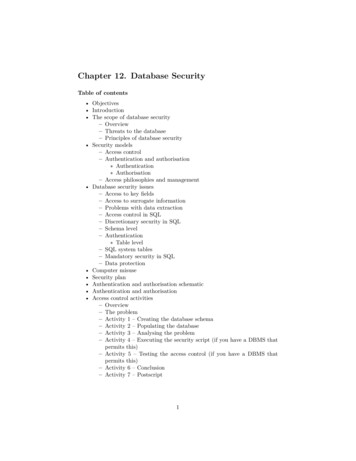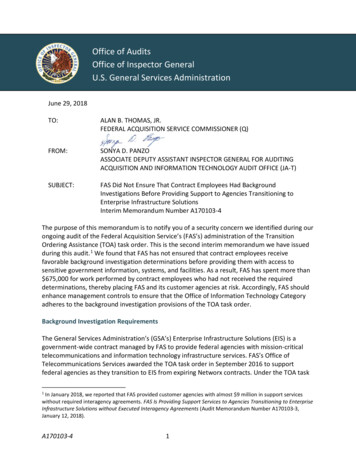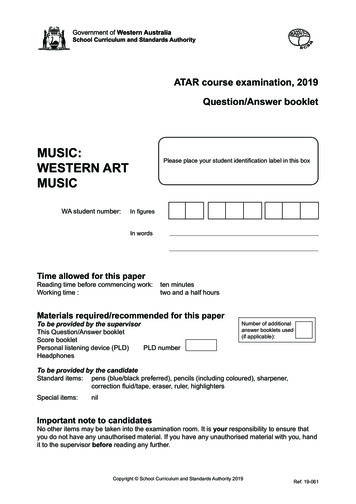
Transcription
western cape office of theconsumer protectorWhat you should know aboutco ntractsThe purpose of this guide is to give ordinarySouth African consumers a very basic guide tocontracts and what they mean in our law.INSIDEWhat is a contract?2Warranties and guarantees 5Contractual terms6Latent and patent defects8Breach of contract11A UCT Law Student Project
what is acontract?A contract is an agreement that is intended tocreate legal rights and duties between the parties.It can be written down or typed out, it can be verbal, or it may even just exist in theminds of the parties. Many people think of a ‘contract’ as a piece of paper that youneed to sign, but a piece of paper or a signature is not always needed for a contract.We enter into contracts every day: for example, you enter into a contract wheneveryou buy or sell something, or when you rent a room in a house, or when you agree towork for someone.EXAMPLEWhen John buys his bread and milk fromJane’s shop, they enter into a contract.Why are contracts different from otheragreements?A contract is different from other agree ments, like an agreement to meet someonefor lunch. This is because contracts createlegal rights and duties.This means that when you enter into acontract, you cannot decide later that youdon’t want to do the thing you have agreedto do. That would be a ‘breach of contract’.EXAMPLEWhen John buys his bread and milk from Jane, they have entered into a contract.John cannot decide after Jane gives him the bread and milk that he does not wantto pay Jane. Jane cannot decide after John pays her that she does not want to giveJohn the bread and milk.If one party breaches the contract, there are many actions the other party can take sothat they will not lose out under the contract. These are called ‘remedies’.This is why you must make sure you can actually do what you have agreed tounder a contract, before you enter it.
how arecontracts formed?Usually a contract is formed once there is an offer by one party, and an acceptance ofthat offer by the other party. When the party making the offer comes to know that theother party has accepted his offer, there will be a contract.In our example above, John offered to buy Jane’s bread and milk when he brought it tothe counter to pay. When Jane accepted John’s money, a contract was formed.Normally, however, when you make a larger purchase, like a set of furniture, there willbe a written contract that you must sign. This simply acts as proof of the agreement.When you buy or sell land or buildings, however, the contract must be in writing.Capacity: Who can enter a contract?Usually, anyone over 18 years of age may enter into a contract. But, there areexceptions to this rule. Some of them are explained below:Young peopleSomeone who is younger than 18 years is called a ‘minor’ in our law. A minor youngerthan 7 years cannot enter into a binding contract at all.A minor older than 7 years can only enter into a contract if – They are assisted by their parent or legal guardian, or their parent/guardian givestheir permission for the contract later They later confirm their own consent to the contract, when they turn 18If a minor between 7 and 18 years old entered into a contract without the necessarypermission or assistance by their parent or guardian, the parent or guardian mustdecide whether the minor should withdraw from the contract or keep to it.The other party must follow the decision of the parent or guardian and cannot use theminor’s age as an excuse to get out of the contract.People under the influence of alcohol or drugsEven if someone enters a contract while under the influence of drugs or alcohol, theymay still have to act under that contract.The effect of the alcohol or drugs will usually have to have been very severe before acourt will let that person out of their contract. That person must not have had any ideaof what he or she was agreeing to.
otherrequirements for contractsPossibilityThere can be no contract to do somethingthat is impossible. If the contract onlybecame impossible after the two partiesentered into it, then the contract simplyfalls away.But, if the contract became impossibledue to the fault of one of the parties, thatwill be a breach of contract, and the otherparty can claim damages (compensation)in court.EXAMPLEJohn and Jane enter a contract for the sale of furniture. But before John candeliver the furniture to Jane, he carelessly leaves the furniture outside his shopand it is stolen. It is impossible for John to now deliver the furniture to Jane, butthe impossibility is his fault. Jane can claim damages from John if she has paidhim already.CertaintyThe terms of the contract must be certain so that each party knows what has to bedone under the contract. In a contract of sale, for example, there must be certaintyabout what exactly is being sold and the price to be paid. Contracts that are not certainare vague, and a court will not uphold them!FormalitiesIn South African law, formalities such as a written contract or the signatures of theparties are not normally necessary except for purchases of land or buildings. What isimportant is that it is clear to the court what the parties agreed to.But, even when buying smaller things like furniture and home appliances, the partiesmight agree that there is no binding contract unless or until their agreement is put ina written document signed by both of them.Also make sure that any changes to the contract are in writing and signed, becausemost written contracts have a term that unless this is done the change is not bindingon the parties.If you enter into a contract that requires formalities, make sure to comply withthem.
LegalityLike impossibility, there can be no valid contract to do something illegal, likepurchasing drugs or stolen goods.Warranties and GuaranteesWe often see products advertised with a ‘warranty’ or a ‘guarantee’. These are simplypromises made by a party in a contract about what he/she has agreed to do underthat contract. That promise then becomes part of the contract: if it is broken, there isa breach of contract. For example –EXAMPLEJohn sells Jane some furniture and gives Jane a ‘2 year warranty’ or ‘2 year guarantee’that the furniture will not break. The furniture breaks after 1 year. Because thefurniture broke at a time when it was still under the warranty or guarantee, John hasbroken that ‘warranty’ or ‘guarantee’. He has breached his contract with Jane.Just like any other term in acontract, a warranty or guaran tee does not have to be writtendown or typed out, like in theexample above. It is enoughthat the parties agree that whatis promised under the warrantyor guarantee will become part ofthe contract.Also, unless the parties agreeotherwise, the law provides anautomatic guarantee againstdefects for three years. Read your contract carefully and check with the seller whetherthis automatic guarantee has been excluded!Where the seller offers you a sample of what the finished product will look like, this isusually treated as a warranty or guarantee. So if the finished product does not look orperform like the sample, this will normally be a breach of contract.This will be the case unless you and the seller agreed that the final product was notguaranteed to look or perform like the sample.
some contractual termsto look out forContracts often contain standard terms that are meant toprotect the supplier. These can be unfair to the consumer, however.Sometimes you may be able to negotiate with a supplier to exclude these terms, buteven if you are unable to do so, it will help you to know what they look like and tokeep an eye out for them!REMEMBER: The general rule is that you are bound by what you sign – this iswhy it is very important that you read your contracts before entering themand, whenever possible, look for assistance in doing so.‘Voetstoots’ clausesA ‘voetstoots’ or ‘as is’ clause means that you are buying the goods as they appear.In other words, they exclude the seller’s liability for ‘latent defects’. These are faultswith the goods that existed when the parties entered the contract, and were notvisible after a ‘reasonable’ inspection.These clauses are perfectly legal, except in ‘credit agreements’ under the NationalCredit Act. If you buy something that later turns out to have something wrong with it,and the contract contained a ‘voetstoots’ clause, you will normally still be bound bythat contract.Only where the seller acted fraudulently – i.e. intended to trick you into buying thefaulty goods – will he be liable to you.This is why it is important to inspect whatever you are buying carefully beforeyou enter into a contract. Perhaps ask a friend who knows a lot about theproduct to assist you.‘No representation’ clausesA ‘no representation’ clause protects the supplier or landlord from the consequencesof any statement they made before or after entering the contract with you. Often,when a seller or landlord is trying to get you to sign a contract, they may say or dothings to try to convince you to enter the agreement.Sometimes these statements are harmless, but sometimes they may be about animportant part of the contract. If they later turn out to be untrue or misleading, theseller or landlord will point to this clause to protect themselves.EXAMPLE‘No statement or representation made by the seller will constitute a warranty,admission of liability or undertaking.’If a seller or landlord makes an appealing statement or promise while you arenegotiating the contract, ask them if they are willing to make it a term of thecontract. If they agree, make sure you comply with any ‘non-variation’ clauses(see below). It is usually better to be careful and get any such statement orpromise in writing and signed by both parties to make sure that the seller orlandlord is bound by their promise.
Non-variation clausesA ‘non-variation’ clause simply holds the parties to the written contract by statingthat any change to the contract that is not in writing is not binding. This type of clausenormally causes problems where a seller or a landlord says you may do somethingthat is not actually allowed in the written contract.EXAMPLEA contract of lease between Jane and John might say that John is not allowed to rent aroom to anyone else while he is renting the property from Jane. The contract containsa non-variation clause. John asks Jane if she can make an exception and allow him torent a room to his friend Winston. Jane says yes. Later, Jane realises she can get morerent for her property if she rents it to her friend Lindi. She cancels the contract withJohn, saying that he has breached the contract by renting the room to James.This is why it is important, if you wish to do something that is not actually allowedunder the contract, to make sure that there is no non-variation clause.If there is one, make sure you comply fully with it and do not simply accept theseller or landlord’s verbal permission.Time-bar clausesA ‘time-bar’ clause gives you a limited time to bring any legal action against thesupplier or landlord in the event that a dispute arises. These types of clauses arecommon in insurance contracts.EXAMPLEIf we reject liability for any claim made under this Policy we will be released fromliability unless summons is served . . . within 90 days of repudiation.If a contract contains a time-bar clause, make sure you remember or write downthe time period in which you can bring legal action against the seller or landlord,in case you ever have to go to court to settle a dispute about the contract.General exemption clausesA general exemption clause excludes or limits a supplier’s liability for many situations.These are often meant to protect the supplier from the consequences of theiremployees’ dangerous or careless conduct.EXAMPLEThe supplier accepts no liability whatsoever for any damage or loss suffered by the customeras a consequence of any of its employee’s fraudulent, negligent or innocent conduct.EXAMPLEJane is admitted to hospital. John, the hospital administrator, gets Jane to sign a contractthat contains an exemption clause before she can receive treatment. One of the hospitalnurses gives Jane the wrong medication and she becomes even sicker, staying in hospitalfor an extra month. When she tries to get the hospital to take responsibility for the nurse’sconduct, they argue that the exemption clause protects them from any claim by Jane.
latent & patentdefectsA ‘patent defect’ is a problem with goods bought that was visible or obvious whenthe parties entered the contract; for example, a broken windscreen on a car.A ‘latent defect’ is a problem with goods bought that existed when the parties enteredthe contract, which was not visible after a ‘reasonable’ inspection.Always inspect the product before you buy it: if you do not, it will be much moredifficult for you to claim that there was a latent defect that the seller must nowcompensate you for!Currently, the law protects consumers from latent defects, unless the seller hasincluded a ‘voetstoots’ clause in the contract. However, if the seller acts fraudulently,he may still be liable despite such a clause.Remember that a latent defect must have existed at the time you entered thecontract. If there was no defect when you purchased the product, the seller cannotbe held liable.However, if a product that you have purchased had a patent defect, it is assumed thatyou knew about the problem when you purchased it. Unfortunately the law does notprotect consumers from patent defects.What is a ‘defect’?A ‘defect’ is an unusual feature that makes a product less useful, or not useful at all, forthe purpose that you purchased it for.EXAMPLEIf John sells Jane an old car, it will not be unusual for the car to have some rust.So, unless the car is very rusty, some rust will not be considered a ‘defect’.But, if John sells Jane a new car, any rust will be unusual and wouldprobably be a defect.The seller will always be liable if the defect makes the product unfit for its normalpurpose.If you purchased the product for some special purpose, other than its normal purpose,you must tell the seller when you enter the contract. If you relied on the seller’s specialknowledge of the product regarding that special purpose, the seller will then still beliable if the product is not fit for that special purpose.
EXAMPLEJohn buys a water pump from Jane and tells Jane that he needs it to be strongenough for the special purpose of pumping water up a steep hill. He knows that Janehas sold other pumps for that very purpose. But when John installs the pump, it isnot strong enough to pump water up the hill. This would qualify as a latent defectfor which Jane could be liable.False statements by the sellerA seller is allowed to praise his own product and talk about it in a way that encouragesyou to buy it. But sometimes sellers make statements that go beyond ‘sales talk’.These statements are about some important quality of the product, for example itsstrength or value, but they are not actually included in the contract. In other words,they are not warranties or guarantees (see above).If such a statement turns out to be false, the law may protect you in the same way asif there had been a latent defect.What are you entitled to for latent defects or false statements by the seller?For a latent defect, or a false statement that goes beyond ‘sales talk’, you are normallyentitled to either – A price reduction: the difference between the price you paid and the true value of theproduct; or A full refund of the price any interest any cost of receiving the product anymaintenance costsIf you receive the full refund however, you will have to return to the seller everythingthat you gained under the contract.Exchange contracts‘Exchange contracts’ are contracts where the thing sold is paid for with another thing,or another thing and some money.If there is a latent defect in or a false statement about any of the things in such anagreement, the innocent party will also be entitled to a price reduction or refund.
EXAMPLEJane sells John her car in exchange for John’s furniture and R10 000. If there is alatent defect in the car or the furniture, Jane or John could be entitled to a pricereduction or refund.Can I ever get more than just a price reductionor a refund?If the defect or false statement has caused youharm worth more than just the value of theproduct, you might be able to claim this fromthe seller.If the defect or false statement has not onlycaused you to pay too much for the product, buthas also caused you further harm, you might beable to claim compensation for this further harmfrom the seller.EXAMPLEJohn buys a car. There is a latentdefect in the car: the brakesdo not work properly and hecrashes into his gate. John mightbe able to claim compensationfrom the seller for any moneylost as a result of the crash (forexample, his medical bills if hewas injured).Trader’s liabilityA ‘trader’ – a seller that actually trades in and earns his living from the goods he sells –is held to a higher standard than an ordinary seller, like John or Jane in our examples.If a trader publicly claims to have expert skill or knowledge in the product sold, you willbe able more than just a price reduction or refund. You will be able to claim all lossesresulting from any latent defect in the product.Breach of contractLatent defects: If the contract guaranteed a certain quality and a latent defect meansthe product does not have that quality, then you will be able to claim compensationfor all resulting loss as damages for breach of contract.False statements: If a statement made by the seller actually became a term of thecontract, then you will also be able to claim damages for breach of contract.MisrepresentationIf the seller acted fraudulently, or knew that the latent defect or the false statementmight cause you further damage, you would be entitled to more than just a pricereduction or refund if you suffered additional losses.
breach ofcontractWhen someone does not do what they have agreed to do under a contract, they arebreaching that contract, and the other party will normally be entitled to compensationor to get out of the contract. But, not just any breach will do:The general rule is that a breach must be ‘material’ before the other party can getout of the contract.There is no rule for telling when a breach is ‘material’ – it will almost always depend onthe facts of your case. A ‘material’ breach is a ‘serious’ breach: a failure in an importantpart of the agreement.However, there are different types of breach, and finding out what type of breach weare dealing with can also help us tell whether a breach is ‘material’ or not. These typesof breach are discussed below:Types of breachI. Late performanceII. Incomplete or unsatisfactory performanceIII. Improperly refusing to comply with the contractIV. Preventing performanceI. Late performanceThis type of breach happens when someone does not do what they agreed to dounder the contract, within the time agreed to. It must be their fault.EXAMPLEJane pays John to fix her wallon Monday at 10h00 but Johnnever arrives because he hasagreed to fix Winston’s wall atthe same time.If the contract has a time for performance, the party automatically breaches thecontract as soon as that time passes.But, if the contract does not contain a time for performance, the other party mustfirst demand performance within a reasonable time. If the party still does not performwithin that reasonable time, then they will have breached the contract.
II. Incomplete or unsatisfactory performanceThis type of breach happens when someone does dowhat they agreed to do under the contract. But, theyeither do not do everything that they were supposedto do, or they do not do it properly. It will not normallymatter whether or not it was their fault that theperformance was incomplete or unsatisfactory.EXAMPLEJohn and Jane agree th
John sells Jane some furniture and gives Jane a ‘2 year warranty’ or ‘2 year guarantee’ that the furniture will not break. The furniture breaks after 1 year. Because the furniture broke at a time when it was still under the warranty or guarantee, John has broken that ‘warranty











